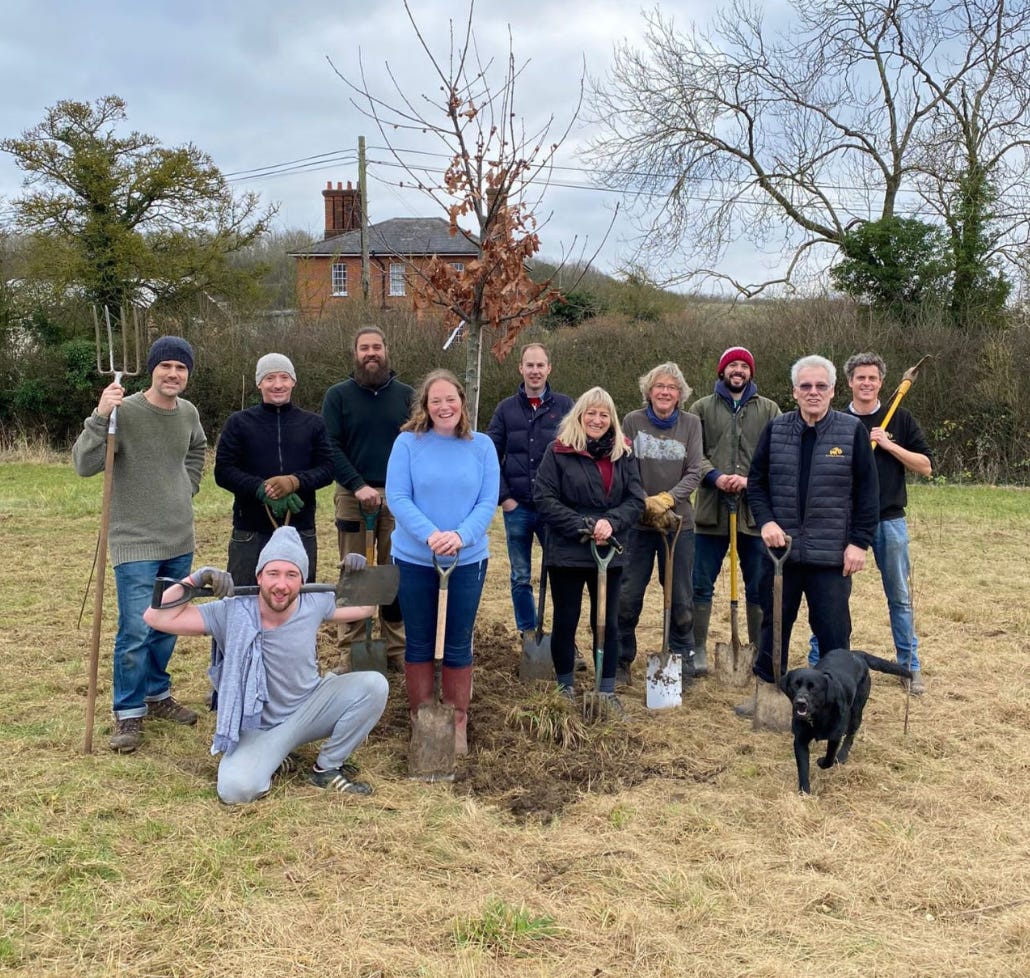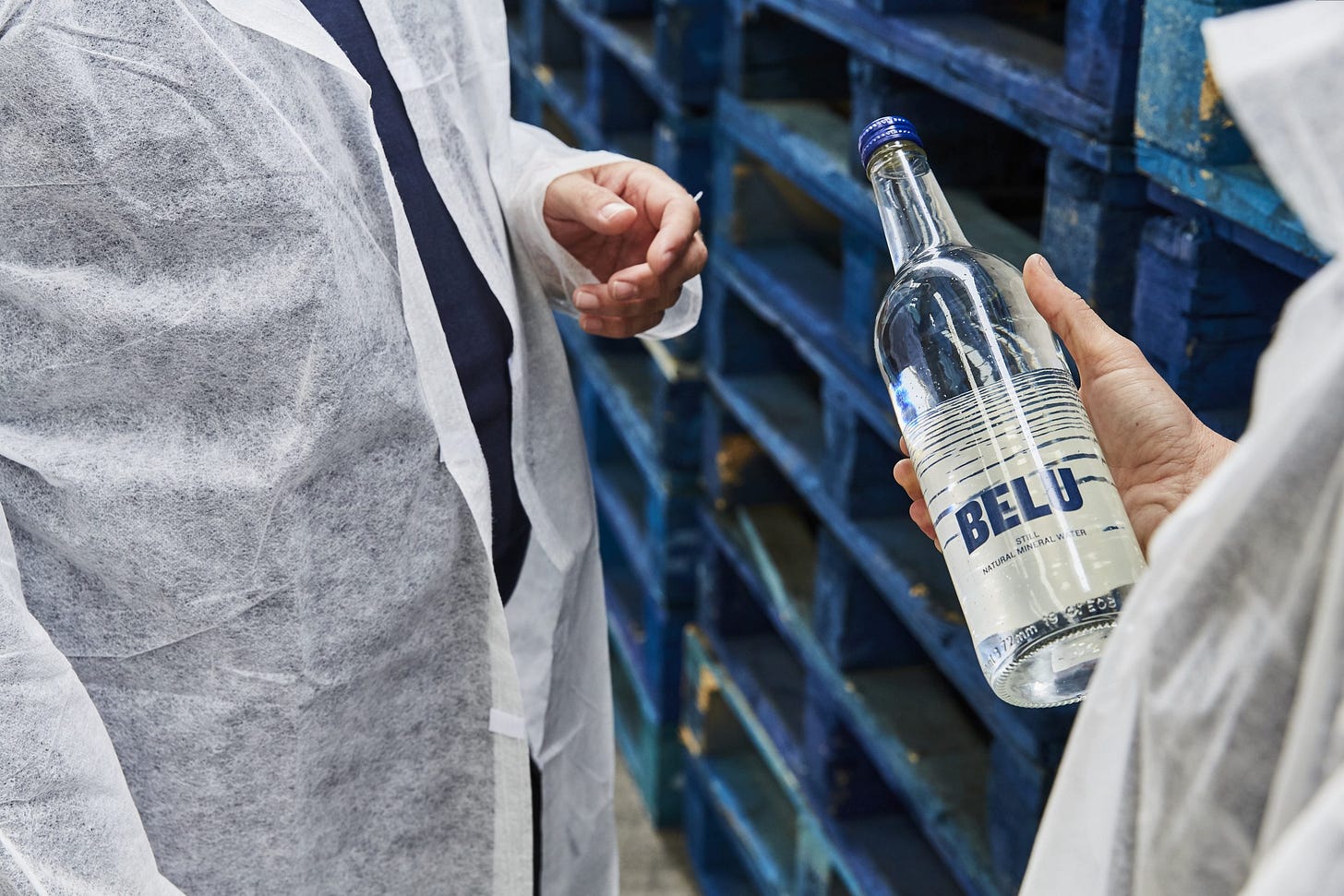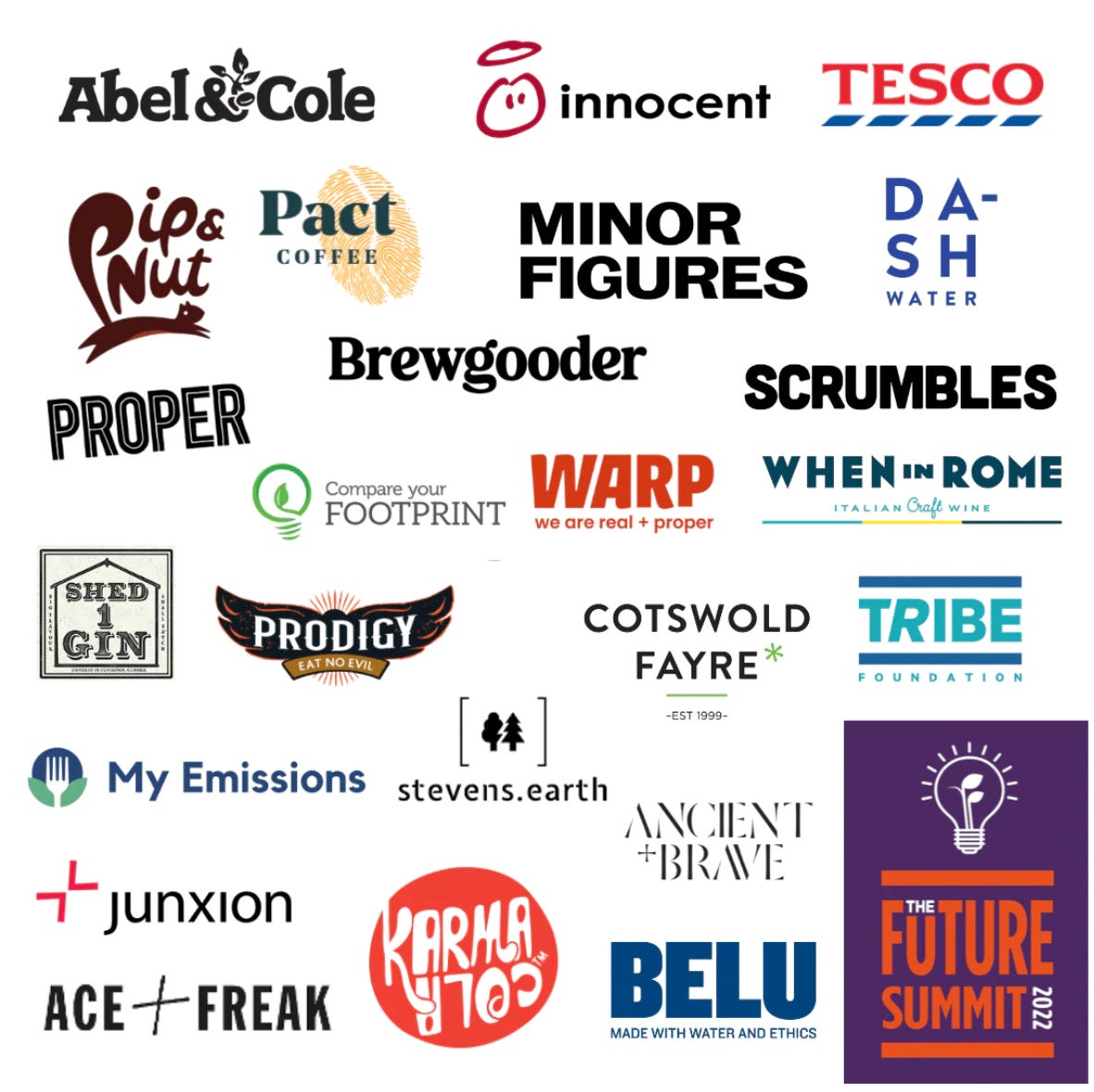🌱 Invest in resilience: How Belu are putting purpose in their P&L, and you can follow suit with Creating Nature's Corridors.
Featuring BELU, Eden Brew, Plant-It and more...
Happy Monday!
This week we cover:
Belu have injected purpose into their P&L - here’s how.
Planting the seed for resilience closer to home: how brands work with Creating Nature’s Corridors.
In case you missed it: Bread & Jam’s Future Summit: Key Sustainability Lessons From Leading Challenger Brands, featuring innocent drinks, TRIBE, Minor Figures, Abel & Cole and more...
> Good News Last Week
🎯 Circular economy company co-cre8’s brand Honest launched their recycled and reusable bottle, made from 100% single used bottles (rPET) and the lid entirely from milk bottles (rHDPE). All materials are sourced in the UK.
🎯 Food tech start-up Eden Brew secured $5 million to scale up their cow-free dairy milk and diversification into ice-cream. The fermented animal-free milk uses 100 times less water per litre than traditional dairy milk.
🎯 Reboxed became the first pre-loved consumer tech brand to achieve B Corp status with 86 points!
⭐️ Suntory Beverage & Food (Lucozade, Ribena & Orangina) announced that their on-the-go bottles will be made from 100% recycled rPET plastics by the end of 2030, which will reduce emissions by over 36,000 tonnes.
⭐️ A project led by Danone and LanzaTech successfully transformed captured carbon from industrial processes into plastic feedstock for PET plastic. Whilst adoption is reported to be a few years away, it’s being hailed as a ‘game-changer’.
⭐️ Morrisons launched The Sustainable Beef & Lamb Scheme, to support and incentivise livestock farmers to reach net zero by 2030.
> Click on each link to read more.
> Quick Take
Belu have injected purpose into their P&L - here’s how.
Launched in 2007, British mineral water brand Belu is now co-led by Natalie Campbell MBE and Charlotte Harrington. As a values-led business, Belu has been driving for the environment first, always. Committed to decreasing the negative impact of their business operations, Belu are using their business to drive real tangible change. All their profits are invested into decarbonising, implementing a circular economy and providing clean water, decent toilets and good hygiene. Juxtaposing the traditional bottom line of driving profit at whatever cost, Belu promotes less consumption, encourages tap water and has a zero export policy, describing the idea of exporting water as “completely unnecessary”.
“By 2030, we will change the way the world sees water.”
As an environmental social enterprise, Belu is not afraid to punch above its weight to solve some of the world’s problems. In 2021 they set themselves a 10 year target which began with changing their Articles of Association to align with the UN Sustainable Development Goals and the statement of Responsible Business Principles. Made for action, Belu hold themselves accountable with the primary objective to carry out their business operations and activities to three sustainable development measures.
1. SDG 6 - Clean Water and Sanitation
Over £5 million donated to WaterAid since 2011, which is invested in clean water, toilets and hygiene education.
Part of a collective movement to increase water access and security for everyone on the planet, Belu’s aim is simple: sell water to bring water to those around the world who face water insecurity. Donating 100% of their net profits to WaterAid since 2011 this has benefitted 330,000 people in communities around the world. Belu has committed to a minimum annual contribution of £100,000 even when they are not trading profitably and publishes their annual audited accounts for transparency. With the ethos that they invest but do not spend, Belu invests their profit in “the pursuit of purpose” and takes time to measure the social and environmental value of this investment.
2. SDG 12 - Responsible Consumption and Production
Nearly 80 million bottles recycled into new Belu bottles and supporting a circular economy.
Made in the UK, Belu’s clear glass bottles are made up of 35% recycled materials and their green glass is made up of 70% recycled material - the highest in the UK. The bottles are also designed to be lightweight, reducing the amount of material used and emissions within transportation. “Using the evidence and the data” Belu decided on glass when the industry was moving towards aluminium cans for the best long-term impact for the environment. Similarly, their plastic bottles, made from 100% recycled materials, generate about 50% less carbon emissions of aluminium cans. Pushing for reusable, Belu Filter in Action saves 12,000 single-use plastic bottles per year for each restaurant that instals their filtration system.
Working with suppliers in their supply chain who also hold their values, bottling business Montgomery Waters focusses on ecological conservation, dedicated to water stewardship and ensuring the protection of the water catchment areas and their communities. Bottle supplier Encirc aligns with the core principles of responsible business and their furnace is fuelled by hydrogen for ultra-low carbon glass bottles and to meet their 2025 goal for decarbonising. Filtration innovators BRITA also have sustainability at their core, with the aim to prevent 1 million tonnes of CO2 from entering the atmosphere and saving the use of over 4 billion single-use bottles each year
3. SDG 13 - Climate Action
Certified in PAS 2060 carbon neutral to reduce the carbon impact of their business.
Certified carbon neutral in PAS 2060, Belu has decided to move away from the focus on being carbon neutral and instead build local partnerships and invest in climate resilience and nature-based solutions. Their Climate Framework demonstrates this direction towards directly reducing the emissions produced by the business operations & activities.
Belu’s Climate Framework:
Full accountability for the emissions produced by their business activities
Reducing value chain emissions and challenging partners
Quantify emissions and align financial investments to combat.
Financial investment in climate and nature based solutions to work towards science-based target for zero carbon output
From 2019 - 2020, Belu reduced their carbon intensity by 34% with a focus on limiting carbon emissions at source. Acknowledging the flaws in offsetting schemes, Belu choose projects that directly add value to their business while increasing the resilience of their upstream supply chain. Belu invested £10,000 in a partnership with the Canal and Rivers Trust to build ‘leaky dams’ to reduce siltation and improve water quality in the Montgomery Canal, near the source of Belu’s water in mid-Wales. This nature-based solution brings benefits for Belu and the environment.
Belu demonstrates how business can be a true force for good and their transparency clearly shows their accountability. With decisions that go against industry and consumer ‘trends,’ like choosing glass and plastic bottles rather than aluminium cans, but with measured positive environmental benefits, it is clear to see that Belu is environment first - always.
Support Belu via their shop:
> Quick Take
Planting the seed for resilience closer to home: how brands work with Creating Nature’s Corridors.
At the Bread & Jam Summit in April (read our recap here), there were many conversations challenging transparency within the carbon offsetting market, many questions of how relevant offsetting projects can be in aligning to your own goals, and many reminders of the importance of auditing every project you invest in. This week, we’re encouraging you to dig into your upstream supply chain and ask yourself how you can build value and increase resilience at the root. Want to take inspiration from Belu, and look for a nature-based solution on home-soil? Let’s dig in…
On a journey to re-wild the corridors of land in the UK, Creating Nature’s Corridors has a purpose to re-balance local natural habitats and provide a more appealing landscape for local communities affected by commercial developments, in the form of green spaces. Founded in 2022 by Vhari Russel with the aim to bring collective impact through “small but achievable change”, Creating Nature’s Corridors is now partnering with businesses to help them achieve their tree planting pledges and safeguard our environment.
Let’s start at the beginning. What is the problem?
Man-made disruption, including motorways and residential development have destroyed thousands of trees and hedgerows across the UK. The destruction of these wildlife habitats is threatening biodiversity and has led to a reduced ability to adapt to climate change. The purpose of a wildlife corridor is to connect patches of fragmented habitat to form a functioning ecosystem over a large area (read more here). Corridors are important as they connect areas with different functions and services for wildlife, like freshwater, shelter, food and pollination. In summary, connectivity is essential for biodiversity conservation.
Their aims:
To plant 10,000 trees/hedges across the UK per annum.
Target the least wooded areas of the country first.
To encourage biodiversity and carbon capture.
To improve the living environment for local communities.
Who have they partnered with already?
With 10,646 trees and hedges pledged to be planted this Autumn across the UK, Creating Nature’s Corridors have been busy partnering with businesses to action this through funding trees, volunteer planting days and donations.
Here’s a few that caught our eye:
NaturePac have committed to planting one tree for every case of fully recyclable cups sold, to drive consumer awareness for sustainable purchasing. As a partner with Creating Nature’s Corridors, they are supporting projects including Saffron Grange and school plantings.
Meat substitute company Plant-It have committed to 5,000 trees and Warner’s Distillery have committed to 3,500 trees, both with Creating Nature’s Corridors as their tree planting partner.
Selected as a charity partner for Speciality & Fine Food Fair and IFE 2023, IFE have committed to planting a tree for every exhibitor at both events.
Working with solicitors HCR Hewiton who are helping to plant and fund trees.
Creating Nature’s Corridors have recently registered with 1% for the planet as a nonprofit partner to help more businesses deliver projects that benefit the environment and communities around them.
A partnership with Essex vineyard, Saffron Grange, has planted over 1000 trees and hedges in their vineyard this year. Funded by donations from the general public and sustainable packaging company Naturepac, and planted in 2 days by a group of volunteers. This included 500 alders in the north of the vineyard to create a natural windbreak, and 59 native trees (including an oak tree) planted to create a space for visitors to enjoy. Alongside creating important habitats for a bio-diverse ecosystem and wildlife to thrive, the trees will also contribute to their efforts for carbon capture.
How can your brand get involved?
A partnership with Creating Nature’s Corridors has the opportunity to drive consumer awareness (with a tree planted for every purchase) and engage employees with hands-on tree-planting days, while enabling your business to deliver nature-based solutions that will build value and have a direct benefit for the environment and your business. With autumn as the tree planting season, now is a great time to think about how to get your business involved. Reach out to join a tree planting day, or make a donation here to help purchase trees.

> In case you missed it
Bread & Jam’s Future Summit: Key Sustainability Lessons From Leading Challenger Brands.
Hear from innocent drinks, TRIBE, Minor Figures, Abel & Cole and more...
> Follow up with…
Article: Starting at the Source: Sustainability in Supply Chains
Podcast: It’s not just a concept: a holistic approach to implement nature based solutions
TV Episode: Recycling: Where Does My Rubbish Go?




